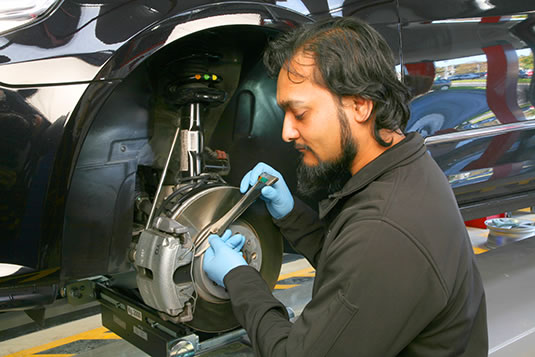The Importance of the Anti-Lock Braking System in Cars
You may have heard of the anti-lock braking system or ABS, but do you know what it does? In a nutshell, the ABS is a safety system installed in all cars since 1980. It prevents wheels from locking up and skidding when you brake hard, which could cause an accident.
The first and most important thing to note about ABS is that it’s not a substitute for safe driving practices. It’s always best to take your time and drive at a safe speed. ABS has been mandatory on all cars registered after 2004, so if you want to know more about the different types of brakes and how anti-lock brakes work, read on!

What is the difference between ABS and other types of brakes?
Anti lock brakes use a series of sensors to monitor speed and wheel spin. If the wheels begin to lock up, the system identifies that and applies pressure to each wheel at different rates to stop the car. This prevents the wheels from locking up.
When ABS is turned on, brake pressure is modulated to maintain optimal stopping power and control. The ABS modulates brake pressure by applying more pressure to the brake pedal when the car is slowing down, while simultaneously applying less pressure when the car is coming to a stop.
ABS was initially developed for commercial vehicles. It was then adapted to automotive vehicles in the 1980s after it was discovered to improve vehicle safety. It is now used on all modern cars to enhance safety.
The ABS uses hydraulic pressure to slow your vehicle. This system is meant to prevent the wheels from locking up while braking, which can cause an accident. It also helps you maintain control of your car while braking on rough or slippery surfaces.
Why do I need ABS?
ABS is designed to help you maintain control of your vehicle in emergency braking situations. The technology senses when one or more of your wheels lose traction and then pump the brake to prevent the wheels from locking up.
Anti lock brakes can be found in many types of cars, including SUVs, hatchbacks, sports cars, vans and more. It can help you avoid accidents when driving on slippery or wet surfaces, whilst driving on steep inclines, or while towing a trailer. Just remember that ABS shouldn’t replace safe driving practices. It’s important to maintain a safe speed and stay alert whilst driving.
The ABS can be helpful when you’re driving in wet conditions, snow or ice. In these situations, wheels can have difficulty gripping to the road and can lock up. It is especially helpful when braking from high speeds, as this will reduce braking distances.
When should I replace my brakes?
Brake pads will wear down over time and eventually will need to be replaced. Even if you don’t drive very often, brakes will still wear out over time. If your brakes squeak, grind or feel mushy, they’ll need to be replaced soon.
For a FREE brake check, click on the button below.
Free Brake Check
To have your brakes replaced, please follow the link below.
Book Now
What to do if your ABS light comes on?
If your anti brake lock light has come on, you can book a diagnostic check with us. This will help find the problem with your ABS and any potential repairs that need doing. To find out more and book a diagnostic, click the button below.
Book Engine Diagnostic
The anti-lock braking system is a very important safety feature on any car. It prevents wheels from locking up when you brake hard and reduces the risk of an accident. Just remember that ABS is a safety feature and isn’t there to substitute safe driving. Always drive at a safe speed and leave plenty of space to the car ahead in case they brake sharply.
Did you enjoy this blog post? |3 people found this review helpful



 Sign up for SPECIAL OFFERS
Sign up for SPECIAL OFFERS
